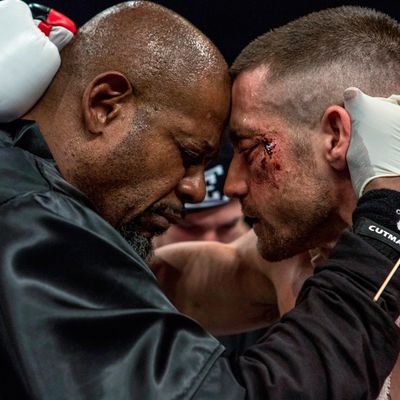
You don’t watch the brutal Jake Gyllenhaal boxing melodrama Southpaw, you go 12 rounds with it. Director Antoine Fuqua gets you to lower your guard with a solemn, deep-toned prologue in which Rachel McAdams as Maureen, the wife of boxer Billy Hope (really!), kneels before her mute husband and tenderly wraps his hands with gauze. Something sacred passes between them: Billy grew up in cruddy state facilities, where he met Maureen when she was 12. She’s not just smoking hot. She holds his fragile soul in her hands.
Then Billy — the light-heavyweight champion of the world — goes into the ring and barely defends himself, taking punch after punch on the way to victory, blood pooling in his left eye and mixing with saliva that falls in strings from his mouth. Maureen knows he can’t endure much more without becoming “punch drunk,” brain-damaged. But Billy has an entourage (among them a steely eyed manager played by 50 Cent who portrays himself as “family”), a taunting adversary named Escobar (Miguel Gomez), and an opulent lifestyle to maintain. And then, with cruel suddenness, Maureen is no longer there, and the long downward spiral begins. It starts horrifically and gets worse, until Billy’s precious 12-year-old daughter, Leila (Oona Laurence), is ripped from his arms and he cries out in agony, like a mortally wounded animal.
It would be easy to giggle at Southpaw — its belly-to-belly clichés and absurd pileup of misfortunes — if Fuqua’s pummeling weren’t so adroit (from the French droit, suggesting right-handed fluency as opposed to the gaucherie of the un-calculating southpaw boxer). Fuqua is slick, I’ll give him that. You know from The Equalizer that he’ll do anything, however unconscionable, to ratchet up the stakes (the murder of a prostitute was especially gratuitous), and Southpaw is the pinnacle of a certain kind of macho sadomasochism. Beside it, Ron Howard’s Cinderella Man is nuanced, Martin Scorsese’s Raging Bull restrained. When little, bespectacled Leila is dragged off by the courts, bound for the kind of parentless, defenseless existence that Billy — with the help of Maureen — fought his way out of, you think Fuqua has hit a new low. But then he introduces another defenseless kid, Hoppy (Skylan Brooks), who has martyred bunny rabbit imprinted on his face. The punishment the movie doles out is unceasing.
50 Cent has the straight-ahead credibility of a businessman; he doesn’t editorialize. And Forest Whitaker — as Tick Wills, the owner of a gym who seeks to protect kids and who takes on the wounded Billy, teaching him balance — is incapable of banality, suggesting Willis is himself a doomed soul.
But it’s Gyllenhaal who dominates Southpaw. He has built himself up in a way that’s not just staggering but expressive. He has big, hurting muscles — combined with his sad-mask-of-tragedy face, they seem to be crying for help. His slowness of manner and slurry diction suggest he was arrested at an early stage of development, not just emotionally but in a Darwinian sense. His Billy doesn’t have the tools to respond to tragedy, and Gyllenhaal makes you believe that he as well as the character is out of control. It’s the kind of performance that makes other actors say, “Wow! He made a strong choice and committed to it!”
I veered between being awed and appalled, though mostly the latter. The trouble with Gyllenhaal is that he shows little range, not from role to role but within roles. He played one emotion (to acclaim) in Nightcrawler and plays one (to equal or greater acclaim) here. The only thing surprising is how far he takes what he does without varying his tone. Although Billy Hope is supposed to learn defense and self-possession, Gyllenhaal never shows how this knowledge transforms him. It’s a brilliant, dull performance.





